Chancellor letter reveals pressure on climate targets
- Published

In the letter, Mr Osborne proposes expanding plans for gas-fired generation
The Chancellor has demanded that the Energy Secretary Ed Davey abandon the UK's pathway towards climate targets.
In a leaked letter, George Osborne says renewables are too expensive and suggests expanding plans for gas-fired generation.
The government's adviser, the Climate Change Committee, says this will cause the UK to miss its 2030 climate goals.
The CCC warns that with volatile gas prices, consumers could end up paying more for electricity, not less.
The demands are laid out in a letter seen by BBC News.
The Draft Energy Bill in the early stages of Parliament aims to keep the lights on whilst meet government goals on climate change.
The CCC advises that in order to meet the goal of an 80% cut in CO2 by 2050 the government needs to have almost all electricity produced by low-carbon sources by 2030.
In his letter, dated 9 July, the Chancellor tells the Liberal Democrat Energy Secretary to give up that ambition and explicitly state that gas will play a core part in generation by 2030.
He writes: "We need to set out an approach which puts costs to consumers at the heart. (We should be) limiting support for low-carbon generation to a level the country can afford.
"We should commit publicly to ensuring that British consumers will be able to get benefits if the price of gas falls."
The Treasury is banking on advice that gas-fired electricity will remain cheaper than renewables, but this is hotly debated. The CCC and the regulator Ofgem warn that high gas prices would force costs up.
The CCC says a strategy focusing on renewables offers carbon benefits as well as insulating consumers from spikes in gas prices.
Mr Osborne's demands are made as part of an ongoing negotiation between Treasury and DECC over consumer subsidies for onshore wind. Mr Osborne says he will agree to Mr Davey's suggestion of a 10% cut in subsidy, but only if his other stipulations are met.
They include an insistence that the onshore subsidies are reviewed within this Parliament. Industry spokesmen say this will deter investors in wind who've already been spooked by government delays in policy.
Another demand is that government takes powers to close down feed-in-tariffs.
David Kennedy, chief executive of the CCC, told BBC News: "This would all lead to a second dash for gas. This would be incompatible with the government's climate change goals."
Environment groups have reacted furiously to the wish-list. Downing Street, Treasury and DECC have declined to comment on the row.
The Chancellor's move was welcomed by Angela Kelly, chair of the anti-wind group Country Guardian. She told BBC News: "I have been fighting against industrial wind farms for 20 years and if the Chancellor is going to do something to rein them in, so much the better."
The Chancellor was also supported by Professor Dieter Helm, head of the government's Natural Capital Committee. He believes the Department for Energy and Climate Change's (DECC's)projections for renewables and nuclear are too rigid.
He told BBC News: "If the impact of the letter is to force a serious reconsideration of energy and climate policy in Britain, that would be a very good thing - the current proposals are seriously flawed."
The Treasury is in a long-standing <link> <caption>dispute with the Energy Select Committee</caption> <url href="http://www.bbc.co.uk/news/science-environment-18922092" platform="highweb"/> </link> over its influence on policy. MPs have asked Treasury ministers to give evidence on the Energy Bill but they have refused.
Back-bench Conservatives opposed to wind farms in the countryside are reported to have been lobbying Mr Osborne.
Joss Garman from campaign group Greenpeace tweeted: "Osborne's position means he's exposed to claim he's putting partisan politics before jobs & investment."
James Murray, editor of BusinessGreen.com said: "Make no mistake this is an all-out assault on the entire green energy sector."
- Published17 July 2012
- Published22 May 2012
- Published26 April 2012